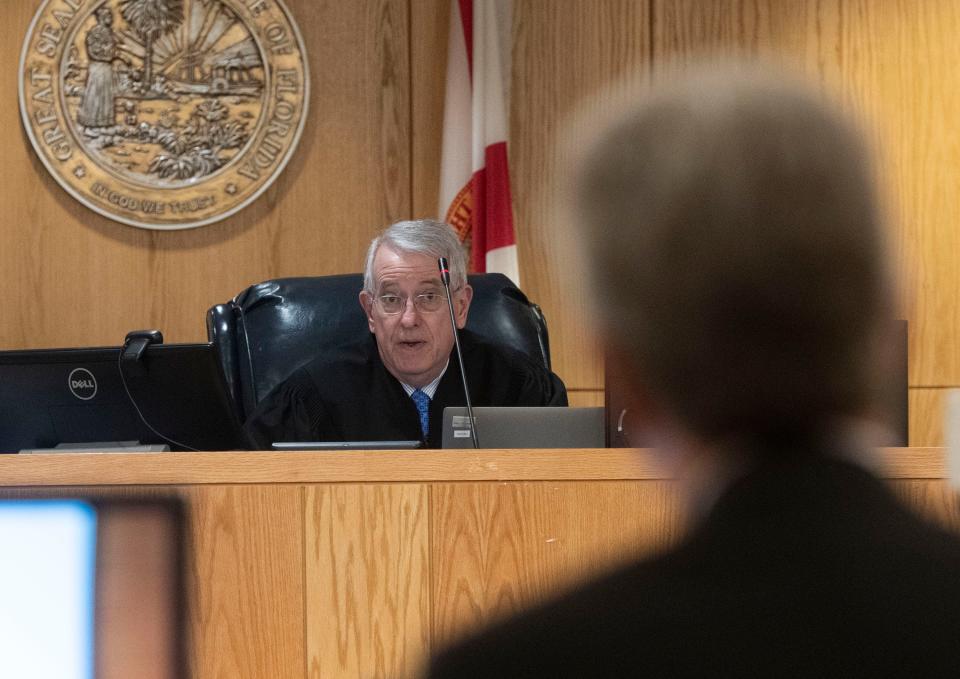Escambia County returns $200K in 'unlawful' commissioner retirement payments
Escambia County commissioners' local retirement payouts totaling nearly $200,000 under a plan that was declared unlawful last month have been returned to the county's public treasury. The official return of the payments marks the conclusion of the more than two-year legal battle.
An Okaloosa County Circuit Court judge ruled last month that the county's local retirement plan that contributed 57% of a commissioner's salary to a 401(a) retirement account amounted to unlawful compensation under Florida law.
The ruling came as a result of a lawsuit filed by the Escambia County Commission against Escambia County Clerk of Court and Comptroller Pam Childers, who blocked the payments to the program at the beginning of 2022.
Escambia County had until Friday to appeal the judge's decision, but County Attorney Alison Rogers recommended against appealing after the ruling. After Childers sent a demand letter requesting that the funds be returned to the county treasury, the county sent its own demand letter to MissionSquare, the firm that managed the local retirement plan.

All county funds deposited into the accounts of the three commissioners who were participating in the local plan were returned to the county, plus any earned interest on Monday. The total amount of funds returned to taxpayers is $197,156.71, according to documents obtained by the News Journal through a public records request.
Former Commissioner Robert Bender's account had the most funds, at $143,491.18, because he enrolled in the program after his election in 2018, and contributions weren't stopped until the beginning of 2022.
Commissioner Steven Barry's account returned $28,586.16 back to the county.
Commissioner Lumon May's account returned $25,076.37 back to the county.
Bender re-entered the regular Florida Retirement System when he was appointed Escambia County Supervisor of Elections. May and Barry re-entered the FRS on Wednesday, according to county spokesperson Andie Gibson.
Had Childers not stopped the payments when she did, the amount that would've been wrongly paid out would be more than $390,000, according to court documents from the lawsuit.
Attorneys Ed Fleming and Aaron McCurdy with the McDonald Fleming law firm, along with Escambia County Clerk attorney Codey Leigh, argued the case on behalf of Childers that won in court.
Fleming said they received inquiries from across the state who were interested in the outcome of the case, which could have radically altered how Florida constitutional officers were paid.
Previously: Pam Childers wins lawsuit: Escambia Commissioner's retirement plan unlawful, judge rules
Had the County Commission won the case, the legal precedent would have been set to allow all 67 Florida sheriffs, tax collectors, supervisors of elections, property appraisers, and all 374 county commissioners to enact local retirement plans that allowed an additional 57% of their salaries to go into individual retirement accounts instead of the approximately 11% they receive with the FRS.
That scenario could have led to a huge loss of funds that keep FRS functioning.
"When you start looking at the financial ramifications of this as a whole, you're talking about tens of millions of dollars, maybe hundreds of millions," Fleming said.
Fleming said the key part of their argument was always that the Florida Constitution requires local officials' pay to be set by the legislature.
"They (the authors of the state constitution) didn't want three votes of commissioners to be able to vote themselves a $57,000 a year pay raise," Fleming said. "If you're going to do that, you have to do it at the statewide level, and that gets more attention."
Fleming said it was good the case was coming to a close, and the episode showed that the systems of checks and balances in the government worked as they were supposed to.
"The system worked exactly like it was designed to work," Fleming said.
This article originally appeared on Pensacola News Journal: Escambia County v. Pam Childers: county returns retirement payments

